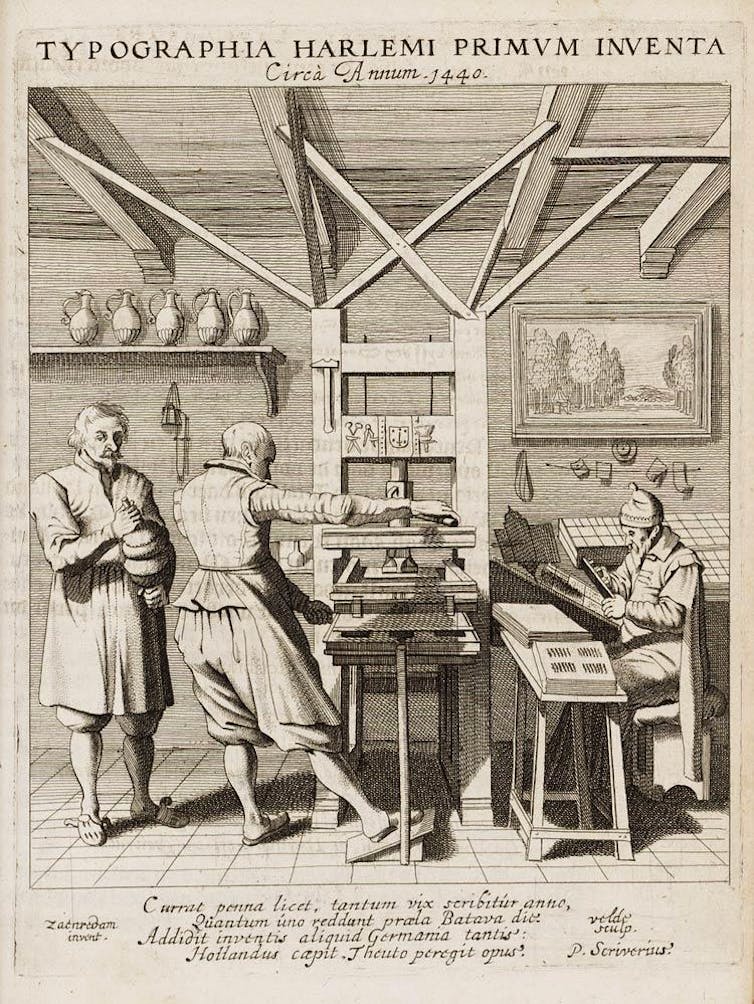We need to consider the social implications of bots writing books about instant chocolate milk
We still tend to think of authors as geniuses. Conversations about prize-winning novels often revolve around authorial intent, and writing a bestseller will tend to confer a certain amount of fame.But this timeworn state of affairs is shifting. The reader, more than ever, is moving centre stage – a shift that is being catalysed by the development of natural language generation (NLG) systems by computer scientists around the world. Written language is no longer a uniquely human construct.
NLG is the process whereby computer data is translated into everyday human languages. NLG has already been applied for many purposes, including aesthetics (poetry, say) and information transfer (for example, weather updates). We’re now at a point where computers generate texts largely indistinguishable from human-authored texts, and at rates incomparable to that of humans.
Written language has, for hundreds of years, served as much of the world’s dominant form of knowledge transfer. Yet history reveals that the author hasn’t always been regarded as an individual creative genius. The medieval European writer, for example, was what we’d now deem a plagiarist, pulling from a range of source texts to make their own. A text wasn’t a manifestation of individuality, but a means for preserving knowledge passed through the generations. Medieval scholars cared little about their books’ writers: they cared about the ancient truths held within.

1628 depiction of Haarlem printing press from 1440. Wikimedia Commons
However, ushering in what book historian Elisabeth Eisenstein calls “cults of personality”, print supported a shift in the cultural mindset. Suddenly the author’s individuality, more than their contribution to the collective, was praised. Of course, print wasn’t solely responsible for this large-scale change, but it certainly both influenced and was influenced by the development of modern individuality.
Now, the success of modern NLG companies represents a further shift in the same direction, further emphasising the individual over the collective. The reader dominates when texts are created especially for her.
The cult of the individual
NLG supports the production of highly localised content: so localised that the algorithm produces it for the individual rather than any collective, accommodating unique social circumstances and worldviews. In such a hyper-individualised climate, reading becomes less of an effort to find authorial intention, and more a personal experience of meaning-making. This shift is symptomatic of a greater shift from a shared culture that reveres expert views afforded by social institutions to one comprising niche groups representing personal interests. No one likes being told what to think. NLG can accommodate individuality.
Nowhere is NLG’s affirmation of individualisation clearer than in the rise of companies like Automated Insights and Narrative Science, which specialise in the generation of news and business intelligence reports for large-scale and niche audiences alike.
Transforming datasets (for example, sports scores, performance measures) into readable narratives, these companies’ systems rapidly generate texts that are highly personalised in both content and register. Such texts present situations in which information appears disembodied from its conveyor. The author is obscured, an uncertain entanglement of human and computer.
While NLG systems may produce texts for mass audiences, one of these systems’ most novel features is their ability to generate texts on even the most niche subjects. Philip Parker’s patented algorithms, for example, generate entire books marketed to specialised clientele. The 2018-2023 World Outlook for Instant Chocolate Milk, Weight Control Products, Whole Milk Powder, Malted Milk Powder, and Other Dry Milk Products Shipped in Consumer Packages Weighing Three Pounds of Less Excluding Nonfat Dry Milk and Infants’ Formula is 310 pages long and priced at a reasonable $995 USD. This book – like the rest of the series – offers easy-to-read charts revealing industry trends. Interested in instant chocolate milk? Parker’s book is a godsend.

A bot can write a book about that. urbanbuzz / Shutterstock.com
Intellectual blinders
But there are ethical issues with such “personalisation algorithms” driving niche content. After all, there’s a fine line between supporting readers’ decisions and controlling them, as a group of researchers from the Oxford Internet and Alan Turing Institutes argue. In theory, personalisation improves decision-making by filtering out irrelevant information
contributing to information overload.
But this filtering process, which is always subjective, reduces exposure to diverse views that may be considered irrelevant or contradictory to the individual being catered for. And if everyone is presented with customised content, exaggerated monocultures form wherein individuals become trapped in echo chambers that only reinforce their current beliefs instead of challenging them.
It may seem pedantic to dedicate such consideration to personalised content like business reports. Yet the systematic omission of “irrelevant” data creates intellectual blinders with very real social implications. We need balanced perspectives – the products of diverse views that challenge our own – to create policies that serve wide publics.
So today’s tendency towards populist anti-intellectualism not only stems from underlying distrust of institutionalised hierarchy, but also from the rise of a hyper-individualised culture partially supported by personalisation algorithms. Everyone’s opinion is valid in light of the information to which she’s been exposed. Indeed, individualised computer-generated content seems to indicate a general defiance of institutionalised hierarchy. The reader, rather than the author, is in control. The reader determines what information matters.
There’s value in individualised computer-generated texts. Readers can get the information they want, quickly. Businesses can evaluate performance in seconds. The issue is not the technology – it is what the technology represents. NLG companies promoting mass production of customised texts survive because readers believe that their individualities are, at least in some contexts, to be prioritised over the collective. This is nothing new: the emergence of print in the 15th century catalysed the development of the modern individual. What is new is the state of hyper-individualisation permitted by an increasingly digitised – and customised – culture.
![]() Individuality is important. But so is society. There is a balance to be struck as the use of NLG continues to spread.
Individuality is important. But so is society. There is a balance to be struck as the use of NLG continues to spread.
Leah Henrickson, Doctoral Student, Loughborough University
This article was originally published on The Conversation. Read the original article.

